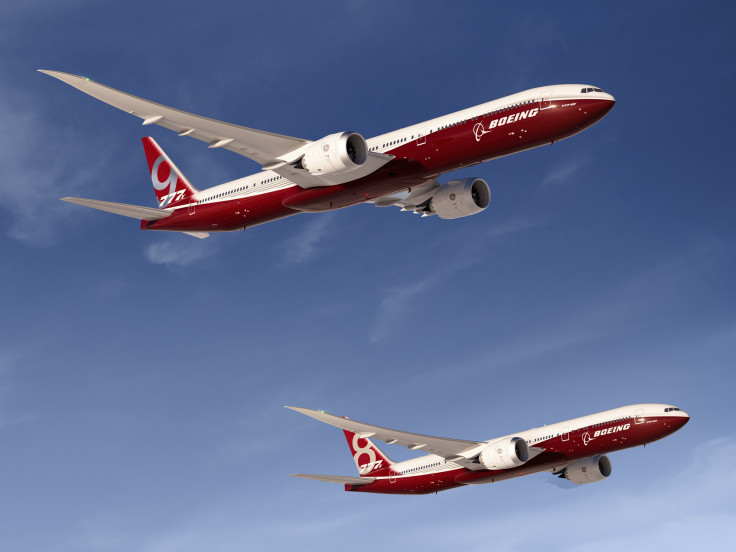Boeing (BA) 777X: What Does Boeing Want In A Plant Site For The New Jet? Find Out Here

The Boeing Company (NYSE:BA) is expected to receive more than a dozen offers on Tuesday from states hoping to win a manufacturing contract for the lucrative 777X passenger jet.
Boeing formally began accepting applications last month after the International Association of Machinists (IAM) rejected a contract that would have kept Washington state manufacturing for eight years and guaranteed thousands of jobs. The rejected deal would have altered wage and pension structure at the company.
Boeing hasn't ruled out keeping production in the state and it has met many state, county and city leaders looking for a cost-effective manufacturing solution. Some analysts caled this strategy an expensive and drawn out bluff with the IAM.
States scrambled to put packages together including big tax breaks for Boeing and related industries, but most will be hard-pressed to compete with Washington state’s $8.9 billion package. Washington's package includes 40 percent business and occupation tax cuts, tax breaks for the aerospace industry, and tax credits for new aircraft development amounting to $3.5 billion.
The question for many is, what's Boeing looking for?
According to an 11-page document leaked to the St. Louis Post-Dispatch, Boeing has several demands, including a $7 billion to $10 billion, 4.2 million-square-foot facility where the entire plane could be assembled, or a comparable site comprising two plants (one to build fuselages and perform final assembly, and a second to build the aircraft’s huge 114-foot-long carbon fiber wing).
"The ideal site would be located immediately adjacent to a major international airport," with a 9,000-foot runway capable of landing 777X and 747-400 freighter airplanes. Boeing also requires easy access to major highways, a dedicated rail track, and, the element that may trip up some states in their bid, a seaport able to host container ships and a standard ocean carrier service.
Interestingly the document makes no mention of unionized workers, something that Boeing is keen to leave behind in Washington state. Instead the company asks for "significant institutional factors" and says, "company preference is toward a location that will share in the cost of capital expenditures" such as buying the land, building and equipping the plant.
Their list of incentives includes:
Site at no cost, or very low cost, to project.
Facilities at no cost, or significantly reduced cost.
Infrastructure improvements provided by the location.
Full support in worker training.
“Entire applicable tax structures including corporate income tax, franchise tax, property tax, sales/use tax, business license/gross receipts tax and excise taxes to be significantly reduced”
In return, Boeing says it will start building the plant next year and start limited aircraft production in summer 2016. It said the staff level will start out at about 3,250 workers in 2018 and reach 8,500 by 2024.
Staying in Washington?
Boeing's past may influence its plans. At November's Dubai Air Show, carriers spent hundreds of billions of dollars, but the firms like Emirates and Qatar Airways made clear that they did not want the kind of problems in 777X production that plagued 787 Dreamliner production in South Carolina. Those included major delays due to to battery issues, freezing engines and fuel leaks, all of which the company attributed to inexperienced workers and far-flung component-manufacturing facilities in the United States, Japan and Italy.
Boeing's requirements appear to be an indirect endorsement for the Washington state workers who, according to an International Machinists Association spokesperson, offer the requisite aircraft production skills. "The legacy skills that exist in Washington State do not exist anywhere else in America, and it's for this reason that Boeing may struggle to find a suitable location."
Boeing is Washngton State’s biggest private employer with 82,500 employees which is one company argument to justify the offered $8.9 billion tax breaks. It's estimated that workforce and the goods it makes would generate $21.3 billion in taxable revenue annually by 2040.
Washington state also meets all the objectives set out in Boeing's RFP demands, which leaves only union-mandated labor and pension contributions as sticking points.
Boeing’s pension hole is about $68 billion, $10 billion more than the company’s market value. Carl Schwartz told the Puget Sound Business Journal in January 2013 that Boeing's relentless quest to unload its pension liability was disturbing. “It is a concern,” he said, “because once they start eroding away this concept of defined pension, then of course the attack will be on those who are already receiving it.”
The Contenders.
Long Beach, Calif., is arguably at the front of the line to win the 777X bidding. Long Beach already has 5,000 experienced Boeing employees who build the C-17 Globemaster, due to end production in 2015. That schedule gives the plant a long time to ramp up for 777X production.
Long Beach and California governments have kept mum on any details, but it’s believed to be one of the few states that could approach Boeing's criteria. And while the workers at Long Beach have agreed to the salary and pension changes that Washington workers rejected, a pension liability still exists, as does growing salaries of workers who have been working for the company since 1991.
Alabama is also a contender. That state's growing aeronautical sector, low wages and right-to-work laws have prompted Boeing rival Airbus to set up shop there.
Utah's Salt Lake City also has a long aircraft-manufacturing history and still produces composites for Boeing, which has its site right next to the local airport. San Antonio, Texas, is expected to place a bid as it’s where Boeing normally overhauls some of its aircraft, including Air Force One. Charleston, S.C., also holds some appeal as it is where Boeing established its first commercial jet assembly outside Washington state, but it’s also the home to many of Boeing 787 Dreamliner's problems.
Boeing is expected to announce the successful bidder early in 2014.
© Copyright IBTimes 2024. All rights reserved.






















